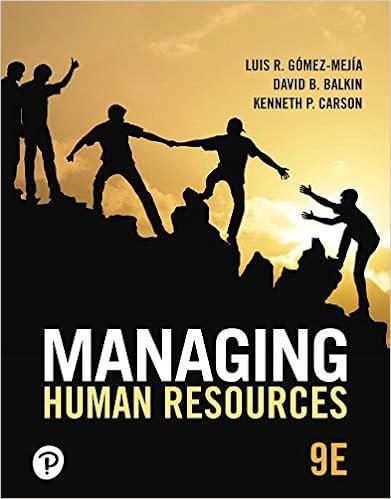Question
Callie Armstrong Callie Armstrong worked as a public school teacher in Oakdale, Ontario for twelve years. As with all teachers, Callie has a duty of
Callie Armstrong
Callie Armstrong worked as a public school teacher in Oakdale, Ontario for twelve years. As with all teachers, Callie has a duty of care that specifies that students are not to be left unsupervised especially in the primary grades (Kindergarten to grade 3). Callie was well loved by her fellow teachers, parents and students and had always achieved very good performance appraisals. Callie is married with two children. Her husband stays at home and looks after the children while Callie works full-time.
In 2019, Callie was diagnosed with acute anxiety over the recent death of her mother and requested a leave of absence from May 1-June 30. Medical documentation was provided and the board of education granted this leave of absence. Callie used all her available sick leave for this leave of absence. Callie returned to the classroom in September of 2019 tasked with teaching a grade 3 class of 20 students. Callie was really looking forward to getting back to doing what she loved best: teaching.
Unfortunately, Callie began having occasional bouts of anxiety and phoned in sick three times in September. In each case, the board was able to find a substitute teacher. Because Callie had no sick leave accumulated, it meant that these absences were unpaid. This caused her further stress because she is the sole income earner.
On October 2, 2019, Callie had a sudden stomach ailment that required her to run to the bathroom immediately. She asked her educational assistant to watch the class and ran to the bathroom. Over the course of the next two weeks, Callie would often experience these symptoms. On November 4, 2019, Callie's doctor diagnosed her with Irritable Bowel Syndrome and prescribed some anti-diarreal medication. Unfortunately, this medication caused a reaction due to a conflict with her anti-anxiety medication and Callie spent three days in the hospital.
Callie met with her principal on November 11 when she returned to work. Her principal said that she noticed that Callie's performance had been steadily declining, that she seemed to lack energy and was often inattentive during professional development days and staff meetings.Callie burst into tears and confessed that she was having a hard time with her mother's death and her recent health issues (IBS and anxiety). The principal asked if Callie wanted a further leave of absence. Callie said that her family could not afford this and that she would do her best to improve. At this point, evidence conflicted between the principal and Callie. Callie did not consider this meeting a disciplinary meeting but the principal documented the meeting and claimed that she told Callie that her performance must improve. The collective agreement clearly stated that any disciplinary meeting must have a union representative present. No union representative was present on November 11.
On December 5, Callie was alone in the classroom (her educational assistant had called in sick that day). Callie suddenly had to run to the bathroom and left the children alone. One of her students wandered out into the hallway and outside without outside winter gear. The daytime high that day was minus 30 degrees. Fortunately a neighbor saw the child banging on the outside door and brought the student to the principal's office. The child was not harmed as a result of the incident. The mother of the child (who happens to be a superintendent with the school) was furious with Callie and has called for her dismissal on social media. The ensuing media firestorm caused a great deal of embarrassment for the school and the board. On December 6, the principal and shop steward met Callie in the principal's office. The principal stated that Callie's employment was terminated with cause. The union has filed a grievance stating that the employer violated the collective agreement and had no grounds for skipping steps in the progressive discipline model. Efforts to resolve this dispute through the internal grievance process have been unsuccessful.
The union alleges that the employer had a duty to accommodate Callie's disability by providing paid time off and/or modifying Callie's duties because of her IBS symptoms. The union also noted that this dismissal would cause Callie's family a great deal of financial hardship. The employer has stated that no medical documentation has ever been provided for the IBS diagnosis. Furthermore, the employer submitted into evidence the fact that Callie has shown little remorse for her role in the incident that led to her dismissal and stormed out of the meeting after unleashing a stream of profanity at the principal. Evidence was submitted on behalf of the employer to demonstrate that the employer has been very consistent with disciplining other teachers for professional misconduct.
In preparing to answer this week's forum question, it might be helpful to consider the following:
- Who has the burden of proof in this case?
- Is dismissal a reasonable punishment given the facts?
- Does the evidence support the alleged wrong-doing of the grievor?
- List the mitigating factors discussed in class and note whether each factor benefits management or union.
- In his case, does the employer have a duty to accommodate Callie's disability? If so, has the employer met this duty?
- Given your understanding of the case, is the employment relationship restorable?
Not base on case for these question below
1. Differences btw conciliation, mediation, interest, and grievance arbitration?
2. Relationship btw union and management ?
3. When we can strike ?
Step by Step Solution
There are 3 Steps involved in it
Step: 1

Get Instant Access to Expert-Tailored Solutions
See step-by-step solutions with expert insights and AI powered tools for academic success
Step: 2

Step: 3

Ace Your Homework with AI
Get the answers you need in no time with our AI-driven, step-by-step assistance
Get Started


